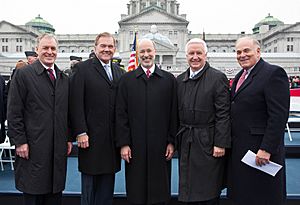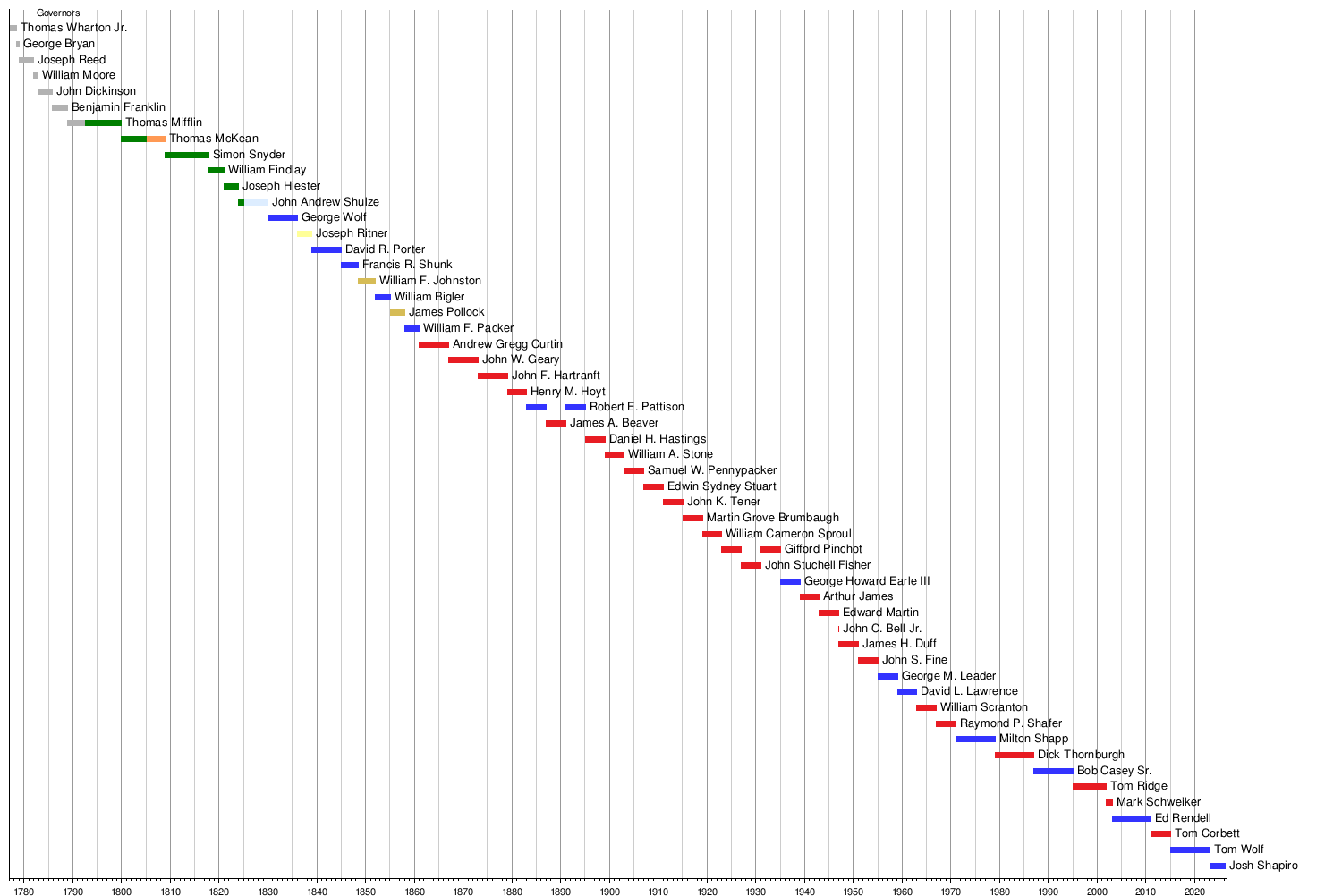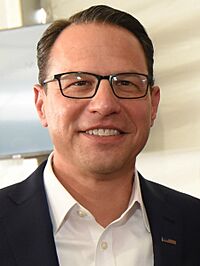List of governors of Pennsylvania facts for kids
Quick facts for kids Governor of theCommonwealth of Pennsylvania |
|
|---|---|

Flag of the governor
|
|

Seal of the governor
|
|
| Government of Pennsylvania | |
| Style |
|
| Residence | Governor's Residence |
| Term length | Four years, renewable once consecutively |
| Inaugural holder | Thomas Mifflin |
| Formation | December 21, 1790 |
| Succession | Line of succession |
| Deputy | Lieutenant Governor of Pennsylvania |
| Salary | $201,729 (2020) |
The governor of Pennsylvania is the top leader of the government in the state of Pennsylvania. They are also the boss of the state's National Guard.
The governor's main jobs are to make sure state laws are followed. They can also approve or reject (this is called a veto) new laws that the state legislature wants to pass. The governor can also call the legislature together for special meetings. They have the power to forgive people for crimes (called a pardon), but not in cases where someone is removed from office (called impeachment). This pardon power can only be used if the Board of Pardons suggests it.
Pennsylvania has had seven "presidents" and 48 "governors" throughout its history. Some governors, like Robert E. Pattison and Gifford Pinchot, served more than one term, but not right after each other. The person who served the longest was the first governor, Thomas Mifflin. He was governor for three full terms. The shortest time in office was by John C. Bell Jr., who was acting governor for only 19 days.
The person who is governor right now is Josh Shapiro. He started his job on January 17, 2023.
Contents
Pennsylvania's Leaders: From Presidents to Governors
Pennsylvania was one of the first 13 colonies that formed the United States. It became a state on December 12, 1787. Before it became independent, Pennsylvania was a colony ruled by Great Britain.
Early Leaders: Presidents of the Supreme Executive Council
When Pennsylvania first became a state, its first constitution (a set of rules for the government) was written in 1776. This constitution created a group called the Supreme Executive Council. This council was in charge of running the state, and it had a "president" as its head. The council chose the president each year.
The constitution also created a "vice-president." However, it didn't say what should happen if the president's job became empty. This happened four times. During these times, the vice-president acted as the leader. One acting president, George Bryan, was later officially recognized as a full governor because he served for more than six months.
| No. | President | Term in office | Vice-President | |
|---|---|---|---|---|
| 1 |  |
Thomas Wharton Jr. (1735–1778) |
March 5, 1777 – May 23, 1778 (died in office) |
George Bryan |
| 2 |  |
George Bryan (1731–1791) |
May 23, 1778 – December 22, 1778 (left office) |
acting as president |
| 3 |  |
Joseph Reed (1741–1785) |
December 22, 1778 – November 15, 1781 (term-limited) |
George Bryan (resigned October 11, 1779) |
| Matthew Smith (resigned November 15, 1779) |
||||
| William Moore | ||||
| 4 |  |
William Moore (1735–1793) |
November 15, 1781 – November 7, 1782 (left office) |
James Potter |
| 5 |  |
John Dickinson (1732–1808) |
November 7, 1782 – October 18, 1785 (term-limited) |
James Ewing |
| James Irvine (resigned October 10, 1785) |
||||
| Charles Biddle | ||||
| 6 |  |
Benjamin Franklin (1706–1790) |
October 18, 1785 – November 5, 1788 (term-limited) |
|
| Peter Muhlenberg (resigned October 14, 1788) |
||||
| David Redick | ||||
| 7 |  |
Thomas Mifflin (1744–1800) |
November 5, 1788 – December 21, 1790 (became state governor) |
George Ross |
Governors of the Commonwealth of Pennsylvania

In 1790, Pennsylvania changed its constitution. It got rid of the council and the "president" job. Instead, it created the job of "governor." A governor's term was three years. They could not serve more than nine years in any twelve-year period.
Later, in 1838, the constitution changed again. Governors could only serve six years out of any nine years. In 1874, the term became four years. Governors could not serve two terms in a row.
The current constitution, from 1968, changed this rule. Now, governors can serve two terms in a row. There is no limit on how many terms they can serve in their lifetime.
Milton Shapp was the first governor to serve two terms under the 1968 rules. Tom Corbett was the first governor to lose an election when trying to get re-elected.
If the governor's job becomes empty because they die, resign, or are removed from office, the lieutenant governor takes over. If the governor is only temporarily unable to do their job, the lieutenant governor just acts as governor. If both jobs are empty, the leader of the state senate, called the president pro tempore, becomes governor.
The job of lieutenant governor was created in 1874. Before that, the speaker of the senate would act as governor if the position was empty. At first, the lieutenant governor could only act as governor. It wasn't until the 1968 constitution that the lieutenant governor could actually become the full governor. The governor's office has been empty for a short time only once, for 17 days in 1848. Governors and lieutenant governors are elected together on the same ballot.
| No. | Governor | Term in office | Party | Election | Lt. Governor | |||
|---|---|---|---|---|---|---|---|---|
| 1 |  |
Thomas Mifflin (1744–1800) |
December 21, 1790 – December 17, 1799 (term-limited) |
None | 1790 | Office did not exist | ||
| Democratic- Republican |
1793 | |||||||
| 1796 | ||||||||
| 2 |  |
Thomas McKean (1734–1817) |
December 17, 1799 – December 20, 1808 (term-limited) |
Democratic- Republican |
1799 | |||
| 1802 | ||||||||
| Constitutionalist | 1805 | |||||||
| 3 |  |
Simon Snyder (1759–1819) |
December 20, 1808 – December 16, 1817 (term-limited) |
Democratic- Republican |
1808 | |||
| 1811 | ||||||||
| 1814 | ||||||||
| 4 |  |
William Findlay (1768–1846) |
December 16, 1817 – December 19, 1820 (lost election) |
Democratic- Republican |
1817 | |||
| 5 |  |
Joseph Hiester (1752–1832) |
December 19, 1820 – December 16, 1823 (did not run) |
Federalist | 1820 | |||
| 6 |  |
John Andrew Shulze (1775–1852) |
December 16, 1823 – December 15, 1829 (did not run) |
Democratic- Republican |
1823 | |||
| Jacksonian | 1826 | |||||||
| 7 |  |
George Wolf (1777–1840) |
December 15, 1829 – December 15, 1835 (lost election) |
Democratic | 1829 | |||
| 1832 | ||||||||
| 8 |  |
Joseph Ritner (1780–1869) |
December 15, 1835 – January 15, 1839 (lost election) |
Anti-Masonic | 1835 | |||
| 9 |  |
David R. Porter (1788–1867) |
January 15, 1839 – January 21, 1845 (term-limited) |
Democratic | 1838 | |||
| 1841 | ||||||||
| 10 |  |
Francis R. Shunk (1788–1848) |
January 21, 1845 – July 9, 1848 (resigned) |
Democratic | 1844 | |||
| 1847 | ||||||||
| 11 |  |
William F. Johnston (1808–1872) |
July 9, 1848 – January 20, 1852 (lost election) |
Whig | Speaker of the Senate acting |
|||
| 1848 | ||||||||
| 12 |  |
William Bigler (1814–1880) |
January 20, 1852 – January 16, 1855 (lost election) |
Democratic | 1851 | |||
| 13 |  |
James Pollock (1810–1890) |
January 16, 1855 – January 19, 1858 (did not run) |
Whig | 1854 | |||
| 14 |  |
William F. Packer (1807–1870) |
January 19, 1858 – January 15, 1861 (did not run) |
Democratic | 1857 | |||
| 15 |  |
Andrew Gregg Curtin (d. 1894) |
January 15, 1861 – January 15, 1867 (term-limited) |
Republican | 1860 | |||
| 1863 | ||||||||
| 16 |  |
John W. Geary (1819–1873) |
January 15, 1867 – January 21, 1873 (term-limited) |
Republican | 1866 | |||
| 1869 | ||||||||
| 17 |  |
John F. Hartranft (1830–1889) |
January 21, 1873 – January 21, 1879 (term-limited) |
Republican | 1872 | |||
| 1875 | John Latta | |||||||
| 18 |  |
Henry M. Hoyt (1830–1892) |
January 21, 1879 – January 16, 1883 (term-limited) |
Republican | 1878 | Charles Warren Stone | ||
| 19 |  |
Robert E. Pattison (1850–1904) |
January 16, 1883 – January 18, 1887 (term-limited) |
Democratic | 1882 | Chauncey Forward Black | ||
| 20 |  |
James A. Beaver (1837–1914) |
January 18, 1887 – January 20, 1891 (term-limited) |
Republican | 1886 | William T. Davies | ||
| 19 |  |
Robert E. Pattison (1850–1904) |
January 20, 1891 – January 15, 1895 (term-limited) |
Democratic | 1890 | Louis Arthur Watres | ||
| 21 |  |
Daniel H. Hastings (1849–1903) |
January 15, 1895 – January 17, 1899 (term-limited) |
Republican | 1894 | Walter Lyon | ||
| 22 |  |
William A. Stone (1846–1920) |
January 17, 1899 – January 20, 1903 (term-limited) |
Republican | 1898 | John P. S. Gobin | ||
| 23 |  |
Samuel W. Pennypacker (1843–1916) |
January 20, 1903 – January 15, 1907 (term-limited) |
Republican | 1902 | William M. Brown | ||
| 24 |  |
Edwin Sydney Stuart (1853–1937) |
January 15, 1907 – January 17, 1911 (term-limited) |
Republican | 1906 | Robert S. Murphy | ||
| 25 |  |
John K. Tener (1863–1946) |
January 17, 1911 – January 19, 1915 (term-limited) |
Republican | 1910 | John Merriman Reynolds | ||
| 26 |  |
Martin Grove Brumbaugh (1862–1930) |
January 19, 1915 – January 21, 1919 (term-limited) |
Republican | 1914 | Frank B. McClain | ||
| 27 |  |
William Cameron Sproul (1870–1928) |
January 21, 1919 – January 16, 1923 (term-limited) |
Republican | 1918 | Edward E. Beidleman | ||
| 28 |  |
Gifford Pinchot (1865–1946) |
January 16, 1923 – January 18, 1927 (term-limited) |
Republican | 1922 | David J. Davis | ||
| 29 |  |
John Stuchell Fisher (1867–1940) |
January 18, 1927 – January 20, 1931 (term-limited) |
Republican | 1926 | Arthur James | ||
| 28 |  |
Gifford Pinchot (1865–1946) |
January 20, 1931 – January 15, 1935 (term-limited) |
Republican | 1930 | Edward C. Shannon | ||
| 30 |  |
George Howard Earle III (1890–1974) |
January 15, 1935 – January 17, 1939 (term-limited) |
Democratic | 1934 | Thomas Kennedy | ||
| 31 |  |
Arthur James (1883–1973) |
January 17, 1939 – January 19, 1943 (term-limited) |
Republican | 1938 | Samuel S. Lewis | ||
| 32 |  |
Edward Martin (1879–1967) |
January 19, 1943 – January 2, 1947 (resigned) |
Republican | 1942 | John C. Bell Jr. | ||
| 33 |  |
John C. Bell Jr. (1892–1974) |
January 2, 1947 – January 21, 1947 (successor took office) |
Republican | Succeeded from lieutenant governor |
Vacant | ||
| 34 |  |
James H. Duff (1883–1969) |
January 21, 1947 – January 16, 1951 (term-limited) |
Republican | 1946 | Daniel Strickler | ||
| 35 |  |
John S. Fine (1893–1978) |
January 16, 1951 – January 18, 1955 (term-limited) |
Republican | 1950 | Lloyd H. Wood | ||
| 36 |  |
George M. Leader (1918–2013) |
January 18, 1955 – January 20, 1959 (term-limited) |
Democratic | 1954 | Roy E. Furman | ||
| 37 |  |
David L. Lawrence (1889–1966) |
January 20, 1959 – January 15, 1963 (term-limited) |
Democratic | 1958 | John Morgan Davis | ||
| 38 |  |
William Scranton (1917–2013) |
January 15, 1963 – January 17, 1967 (term-limited) |
Republican | 1962 | Raymond P. Shafer | ||
| 39 |
.
|
Raymond P. Shafer (1917–2006) |
January 17, 1967 – January 19, 1971 (term-limited) |
Republican | 1966 | Raymond J. Broderick | ||
| 40 |  |
Milton Shapp (1912–1994) |
January 19, 1971 – January 16, 1979 (term-limited) |
Democratic | 1970 | Ernest Kline | ||
| 1974 | ||||||||
| 41 |  |
Dick Thornburgh (1932–2020) |
January 16, 1979 – January 20, 1987 (term-limited) |
Republican | 1978 | William Scranton III | ||
| 1982 | ||||||||
| 42 |  |
Bob Casey Sr. (1932–2000) |
January 20, 1987 – January 17, 1995 (term-limited) |
Democratic | 1986 | Mark Singel | ||
| 1990 | ||||||||
| 43 |  |
Tom Ridge (b. 1945) |
January 17, 1995 – October 5, 2001 (resigned) |
Republican | 1994 | Mark Schweiker | ||
| 1998 | ||||||||
| 44 |  |
Mark Schweiker (b. 1953) |
October 5, 2001 – January 21, 2003 (did not run) |
Republican | Succeeded from lieutenant governor |
Robert Jubelirer | ||
| 45 |  |
Ed Rendell (b. 1944) |
January 21, 2003 – January 18, 2011 (term-limited) |
Democratic | 2002 | Catherine Baker Knoll (died November 12, 2008) |
||
| 2006 | ||||||||
| Joe Scarnati (acting) |
||||||||
| 46 |  |
Tom Corbett (b. 1949) |
January 18, 2011 – January 20, 2015 (lost election) |
Republican | 2010 | Jim Cawley | ||
| 47 |  |
Tom Wolf (b. 1948) |
January 20, 2015 – January 17, 2023 (term-limited) |
Democratic | 2014 | Mike Stack | ||
| 2018 | John Fetterman (resigned January 3, 2023) |
|||||||
| Kim Ward (acting) |
||||||||
| 48 |  |
Josh Shapiro (b. 1973) |
January 17, 2023 – Incumbent |
Democratic | 2022 | Austin Davis | ||
Timeline of Governors
| Timeline of Pennsylvania governors |
 |
More to Explore
- Gubernatorial lines of succession in the United States#Pennsylvania
- List of Pennsylvania gubernatorial elections
- List of Pennsylvania state legislatures
- List of colonial governors of Pennsylvania
 | Janet Taylor Pickett |
 | Synthia Saint James |
 | Howardena Pindell |
 | Faith Ringgold |


